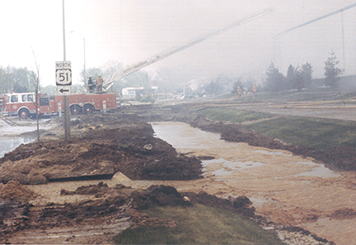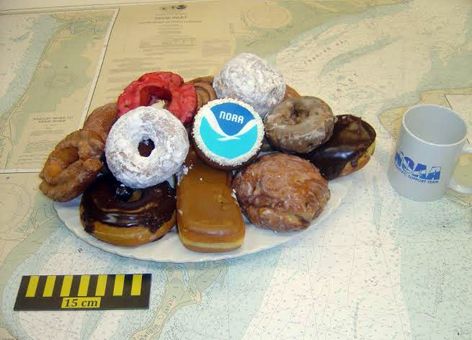Wishing You a Happy Donut Day (Free of Frying Oil Spills)
JUNE 5, 2014 -- Tomorrow we celebrate National Donut Day.
As scientists who work in oil spill response, and who also love these oil-fried creations, we know that donut oil can harm the environment almost as severely as the oils that are typically spilled on our coastlines and rivers.
When we talk about "oil" spills, we are generally referring to petroleum-based oils—the naturally occurring products, such as crude oil, found in geologic formations.
But the oil and fats that we use to fry our food come from animals (e.g., lard/tallow, butter/ghee, fish oil) or from seeds and plants (e.g., palm, castor, olive, soya bean, sunflower, rape-seed). Like petroleum products, these oils can spill when they are stored or transported. When an accident occurs, large quantities of oil can spill into rivers, lakes, and harbors.
Although vegetable oils and animal fats are not as acutely toxic as many petroleum products, spills of these products can still result in significant environmental damage. Like petroleum oils, vegetable oils and animal fats and their components can have both immediate and long-term negative effects on wildlife and the environment when they:
- Coat the fur or feathers of wildlife, and even smother embryos if oil comes in contact with bird eggs.
- Suffocate marine life by depleting the oxygen in the water.
- Destroy future and existing food supplies, breeding animals, and habitats.
- Produce rancid odors.
- Foul shorelines, clog water treatment plants, and catch fire when ignition sources are present.
- Form products that linger in the environment for many years.
Many non-petroleum oils share similar physical properties with petroleum-based oils; for example, they don’t readily dissolve in water, they both create slicks on the surface of water, and they both form water-oil mixtures known as emulsions, or "mousse." In addition, non-petroleum oils tend to be persistent, remaining in the environment for long periods of time.
In an earlier blog post, Recipes for Disaster, we describe spills of coconut oil, palm kernel oil, and even butter, which emergency responders across the United States have had to address. In addition to the oil spill response tools and resources we use to mitigate spills of all types, EPA's explanation of the rules that apply to animal fats and vegetable oil spill planning and response, and response techniques suggested by CEDRE, researchers are finding new ways to clean up spills of vegetable oils.
For example, at Washington University in St. Louis, researchers have found that adding dry clay to spilled oil results in formation of oil-mineral combinations that sink to the bottom of the water. The process works best under conditions of relatively low mixing in the water, and is acceptable only if the oil can be broken down naturally in the sediment.
Back to National Donut Day and things that can be broken down naturally in your stomach. Enjoy your glazed, jelly-filled, or frosted-with-sprinkles delight however it is prepared—with vegetable oil, shortening, or maybe coconut oil. And if you're thinking of enjoying your donut with a glass of milk, start thinking about what might happen when milk spills into our waters.

 An official website of the United States government.
An official website of the United States government. 
